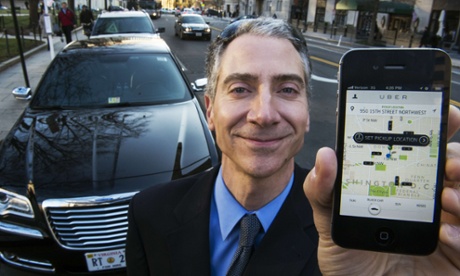Uber's $18 bn valuation is just another fantasy marketed by Silicon Valley
When you buy a tech stock at a huge multiple of its revenues, you are betting on almost unimaginably larger future profits

Friday's Uber valuation should mark a nadir in tech insanity: not only has the last sane person in the Valley left and switched out the lights, but someone probably paid him at least a billion dollars to do it.
Silicon Valley’s venture capitalists have collectively decided that a much-impersonated piece of taxi-despatch software – you might know it as Uber – is worth $18bn.
Yep, you read that right: a one, an eight, followed by nine whole zeroes. Enough money to build the new One World Trade Center six times over. Enough to give every one of the USA’s 21.8m veterans $820 each, with change left over. Enough cash to make the person who has it the 21st richest person in America, just behind Steve Ballmer.
It is, in short, a shit-ton of cash.
In reality, almost no-one will even blink at the number, because this sort of fantasy is created (and marketed) every day. So long as there are greater fools down the line – prepared to buy into the hype and load up on tech stocks – the train will carry on: founders cash in on the venture capitalists, who in turn get rich off the backs of our pension funds and 401ks, who load up on these stocks after buying into the West Coast hype.
Here’s how that theory works: sure, companies like Uber aren’t making much money now. But they’re growing fast and changing the world – so, after they have reach, suddenly it’ll be possibly to turn one's investment into huge, world-changing profits.
But when you buy a tech stock at a huge multiple – and Uber’s revenues have been (generously) estimated at around $200m a year, which makes $18bn a borderline-insane 90x valuation – you're making a bet that its profits down the line will be vastly larger than they are today. In fact, you're betting that they will be almost unimaginably larger.
There is absolutely no reason to believe this is true. Uber has rivals in every market it's in – both established players fighting off the insurgents, and Uber-like rivals with similar software products. Uber and all its rivals are dueling one another for taxis – lowering fares and their percentage takes, even offering lunch or $500 bonuses to drivers.
That might prove good news for taxi travellers (it also might not), but it’s hard to see how it’s ever going to turn into reliable monopoly profits to support this kind of valuation.
The reason that none of us call out each individual company on this sort of nonsense is that everyone's doing it and getting away with it – Twitter and Facebook both have valuations way out of line with their profits, and have consistently struggled to show any sign that they’re going to be awesome at monetizing their users tomorrow when they're mediocre at it today.
Vice's boss trolls the world claiming his magazine-and-internet-video empire is worth $20bn – in a universe where even the Washington Post barely scrapes $250m.
Every day we’re told the world is being disrupted, and maybe it is. But where is all this cash actually going to come from?
It’s easy to think that this mad exuberance is victimless idiocy. It’s not. In any society, in any economy, there’s only so much investment cash to go around. The cash that’s getting thrown at overinflated companies in sunny California isn’t doing anything in the rest of the economy.
More and more faith is being put into the idea that the Silicon Valley’s Potemkin village will be the new powerhouse of the US economy. Were the valuations lower, there’d be more cash for other investments which might deliver equal or better returns, like green energy, modern manufacturing, or even staid-but-solid sectors like retail. If tech is over-invested, the rest of the economy gets comparatively neglected.
All of that is before we even start to consider the borderline sociopathic business models of many of the latest wave of tech firms. AirBnB – and its users – are battling with the longer-term difficulties of setting up a system that could be said to encourage thousands of people to break the terms of their leases (and others to potentially break hoteling laws) as regulators catch up, while the company beds in for the long-haul.
Uber is learning that licensed taxi drivers are hard to mess with around the world. People might like an insurgent, but vested interests fight back – and some regulations are there for a reason. Aggressively breaking them down, as some companies have done, and then asking permission after the fact, only works for so long.
There’s a hell of a lot of talent in the Valley, and companies building some brilliant technology.
But between the business models, the attitude and the valuations, there’s a risk that this is turning into the worst kind of party. The frat boys have crashed, they’re talking themselves up, having a great time, and hogging all the beer.
But we all know how this story ends: sometime soon, someone else is going to be wiping up their vomit.

 Main
Main  Forum
Forum Registration
Registration Login
Login